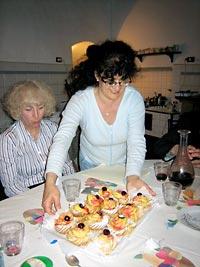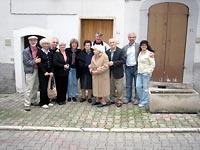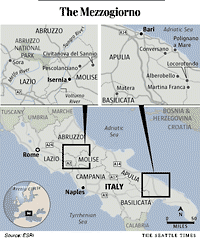The language of love? It's all relative

Maybe you have some second or third cousins who live in Italy, or maybe you have friends with relatives in southern Italy.
Don't be shy. Don't worry about people not speaking English.
If you get an invitation to visit, go.
If you're from America, you're family.
My grandparents lost touch with our relatives in Italy, but my husband's parents have kept in contact with various cousins, uncles, aunts and friends of friends.
We last visited his third cousin, Vito, 24 years ago, on our first trip to Italy. Vito and his wife, Isa, were dating at the time, and Vito's mother and father were in their mid 60s, living in a house in the rural village of Civitanova del Sannio, where Tom's grandmother was born.
I'll never forget the afternoon meal at their home. We ate around two tables pushed together to hold all the cousins, uncles, aunts and in-laws.
The women stood in the kitchen doorway, watching for plates to refill. Jugs of wine were emptied and replenished. The lunch went on for hours, and when we finished, we all lined up outside the house for a group picture. I laugh everytime I look at it. At just 5 feet, four inches, I was one of the tallest in the photo.
Many young people leave southern Italy's small towns for jobs in Rome or Naples. But Vito and Isa stayed, married and raised two children. Vito's mother and father, now in their 90s, still live the same house across the street from Isa's mother, a few blocks from the elementary school where Isa teaches.
So here we were again, older and grayer, this time with four of our Ohio family members, following Vito in his car as we drove through the countryside to Civitanova where Isa was home making lunch.
Vito and Isa speak French, but no English, and I speak only basic Italian, so they rustled up a few English speakers for our visit, including Isa's sister and a teacher friend of Vito's.
"My relatives from America"
Twenty-four years doesn't make a lot of difference in a town that's centuries old, but we noticed a few changes when we got to Civitanova. It's mainly a residential village whose 950 residents are retired or, like Vito, work in Isernia. Many of the houses were newly painted, and there was an Irish pub and a new boutique hotel, signs of the town's transformation into a summer and weekend tourist destination for Italians from the cities.
We walked around a bit and Vito bumped into a friend, an ironworker and artist who was working in his garage.
"My relatives from America," he introduced us.
"Welcome to Civitanova!" the man said. Then he disappeared into his workshop. He came out with a plastic jug of his homemade wine, and apologized for having just one clean glass.
He filled it with wine and handed it to one of my brothers-in-law, motioning for him to chug it down, then pass the glass to someone else for a refill. But it wasn't yet 1 p.m., so we each just took a sip, and when we finished, he poured himself a glass and drank it in one swallow.
Vito and Isa live in a 200-year-old house with plenty of room spread over two floors, except for the kitchen, which is smaller than most American bathrooms.
Isa's homemade noodles lay on a table near the dining room, and, when we walked in, she proudly showed them off before plunging them into a pot of boiling water. We exchanged hugs and passed around photos we had brought from home. There was lots of pointing and gesturing and laughing. Pretty soon, it seemed, we all forgot that we were speaking different languages.
Il pranzo
No meal in a restaurant, not even the one we'd had the night before at our agriturismo, can compare to a home-cooked Italian lunch, or "pranzo."
There were fewer people at the table this time. Several relatives in that picture we took 24 years ago had died. Isa and Vito's children were away for the weekend, and Vincenzo's wife, Michelina, was feeling too tired to come.
Isa and Vito filled the table with plates of cured meats and cheeses, sausage and bread. Vito poured wine, and his 90-year-old father, Vincenzo, began talking excitedly in Italian. We couldn't understand much, but it didn't matter to him. He kept on talking, especially to Tom's older brother, Al, who looks more Italian than the rest of us.
Next came bowls of the pasta with Isa's homemade tomato sauce, then platters of braised meat cooked with local greens, fruit and, finally, a tray of giant cream puffs from a local bakery.
We sat drinking espresso, looking through photo albums and talking into the late afternoon. Vincenzo kissed pictures of Tom's grandmother, his aunt, who died 20 years ago in Ohio at 94. Then Vincenzo said it was time for him to go home for a nap.
He pushed back his chair, smiled, and said something in Italian again. This time I understood. He was as thrilled to have us as we were to be there.
"Questa e una bella giornata!" he said with a smile, helping himself to another cream puff.
"This is a wonderful day!"
Next: Naming names in a small town



Tips for visiting relatives and friends
• Bring photos from home of your family, children, your house, etc. They make great conversation pieces in any language.
• Bring a gift — especially something sweet. Don't be offended if they put the package aside to open after you're gone.
• If you're driving, buy a good map that lists all the smaller towns and villages. The Touring Club of Italy publishes detailed maps for specific regions.
• Arrive on an empty stomach. Chances are you'll be expected to eat.
Don't know Italian?
• Try one of the free language-translation sites on the Web for sending basic e-mails from the U.S. to Italy. See http://babelfish.altavista.com or www.google.com/language_tools?hl=en.
• Bring along an English/Italian pocket dictionary, or a translator program for your Palm Pilot or Blackberry.
• Learn a few words and key phrases such as "Hello," "Thank you," and "This food is great!" But don't worry too much. There's usually someone around who can help translate. Smiles, laughs and touches go a long way.
Genealogy research
• See www.italyworldclub.com for ideas on researching your roots. Go to "Forums" to post questions and exchange information about specific regions and provinces.